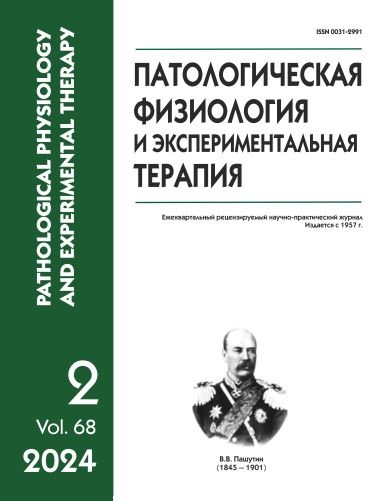Outcomes of COVID-19 coronavirus pneumonia with kidney damage
Abstract
Aim: To evaluate the outcomes of COVID-19 coronavirus pneumonia with kidney damage depending on the presence and dynamics of concomitant pathology.
Methods. A retrospective analysis was performed of 300 case reports of patients over the age of 18 years without fatal outcomes,
who were admitted to a hospital for coronavirus infection complicated by pneumonia and had no history of urinary tract diseases.
103 of 300 evaluated clinical records (34.3%) showed changes in urine tests and constituted the study group to be compared with
patients who had no changes in urine tests (comparison group). Clinical and biochemical blood tests, clinical urinalysis, computed
tomography (CT) of the lungs, and detection of the COVID-19 virus by polymerase chain reaction in oropharyngeal and nasopharyngeal smears had been performed in all patients. At 6-7 mos after discharge from the hospital, patients of the study group with
changes in their urinary tests were contacted and interviewed about their health and well-being.
Results. Changes in urine tests were most often found in coronavirus pneumonia of CT-2 severity. Concomitant pathology was
detected in 170 of 300 (56.7%) patients with coronavirus pneumonia (p<0.01, χ-squared criterion). In the study group the number
of patients with concomitant pathology was significantly more frequent (65; 63.1%, p<0.01) compared with patients without concomitant pathology. Most commonly, the patients in the study group had hypertension (34; 33%) (p<0.01, χ-squared criterion), diabetes mellitus (14; 13.6%), and obesity (8; 7.8%). A similar pattern was observed in the comparison group. Concomitant pathology
was significantly more frequent in patients with elevated serum creatinine values, 42 (24.7%) and 20 (15.4%) (p<0.05, χ-squared
criterion). The remaining indicators did not differ significantly. The presence of changes in urinary tests was accompanied by significant proteinuria and leukocyturia in groups both with and without concomitant pathology.
Conclusion. Almost 30% of patients with COVID pneumonia complicated by acute kidney disease need further dynamic monitoring after discharge from the hospital and do not receive recommendations for outpatient follow-up by specialists upon discharge






